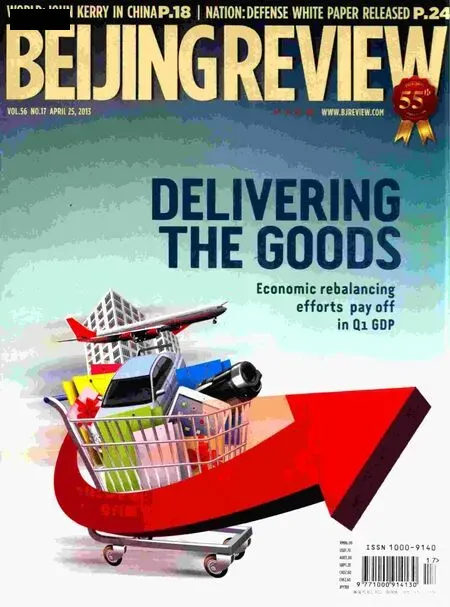Cool Carl-ist
By Yuan Yuan
Cool Carl-ist
By Yuan Yuan
Youth culture embraces a thrifty lifestyle
No beverage, just water. No snacks, only meals. No cash, but coupons. No new arrivals. Discounts, discounts, discounts! Such are the principles of the “cool carls,”people who don’t necessarily earn little, but who certainly strive to spend as little as possible. Most of them own property or cars and earn a middle-class income, but they nonetheless seek to live a most economical lifestyle.
As the Central Government puts forward its own answer to austerity by maintaining public investment at sustainable levels while addressing extravagancy and inefficiency, cool carlism similarly draws inspiration from traditional Chinese values of thrift and savings.
Being frugal
The Chinese word kou, which means frugal or stingy with money, shares similar pronunciation with carl, an archaic Germanic synonym for miser or churl.
“To be a cool carl means to be frugal in a very cool way,” said 28-year-old Xu Qi, an editor at the Beijing Cultural Communication Co. She manages to put away half of her 8,000 yuan ($1,296) salary into savings every month.

Xu shares an apartment near her company with a workmate and pays 2,500 yuan ($405) in rent and only spends 1,500 yuan ($243) every month on basic necessities like food and transportation. “People don’t know how I make it and they think I live a very miserable life,” Xu said. “But it is not true. I spend little, but it doesn’t mean my life quality is low.”
Xu doesn’t buy vegetables or fruits from the market. “I have a friend who runs an organic farm in a suburb of Beijing,” Xu said.“I pay her 2,000 yuan ($320) a year and she delivers 5 kg of vegetables every week. It is a good deal. I don’t eat out at all as homemade meals are much healthier and more delicious.”
As a theater lover, Xu scours the Internet for ticket promotions. “Some agencies offer free tickets if you write a review on the director’s previous play,” Xu said. “It is an easy task.”
Two years ago, Xu lived paycheck to paycheck and was often penniless by the end of every month. Matters became worse when she contracted acute gastritis and lacked the funds to pay her hospital bills, finally turning to her parents with no small amount of shame.
“I decided to change my spending habits,”Xu said. “I refuse to go to KTV and normally don’t eat out. Now I feel very peaceful and healthier.”
Du Ming’s change to a frugal lifestyle came with his decision to start his own business. The 29-year-old used to be an accountant in Taiyuan, the capital city of north China’s Shanxi Province. At the end of 2012, Du decided to open his own company.
Earning about 20,000 yuan ($3,240) a month, money was never really a problem for Du, but his love of luxury brands Armani and Givenchy was such that he was always among the first to buy new arrivals. “I swiped my credit cards without knowing what the balance was,” recalled Du, “I didn’t even think whether I really needed the items or not.”
Du maxed out five credit cards from different banks with his unbridled spending. Du never thought it was a serious problem until he calculated the costs of running his own business.
A poor credit rating meant difficulties in getting loans and he was forced to cut costs by buying used office equipment. At home, he would do his own housekeeping and usually cooked his own meals. He even brought his own plastic bags to supermarket to save the 0.2 yuan ($0.03) for a grocery bag.
Du’s business has been growing fast and he thinks it is the blessing of his new frugal lifestyle. In March, Du got married and his wedding was also very simple. “My wife and I just invited family members and close friends for dinner. No big ceremony and banquet,” Du said.
In groups
On April 14, a group of young office workers in Louyu Community in Xiacheng District in Hangzhou City, east China’s Zhejiang Province, formed a club called IKOU to share discount information online, take advantage of group discounts, and even share taxis.
Xia Xiaoqing, a 26-year-old member of IKOU, has long been regarded by his friends as a weirdo. She splits napkins, skips the spin cycle when washing clothes, and plants her own vegetables on her balcony.
“But they all love me and always ask me to go shopping with them as I can help them find bargains,” Xia said. “Other girls always regret buying something, but not me.”
Xia uses many software applications to compare prices online before making purchases.
In 2012, Xia and her boyfriend bought their apartment, a small studio in the center of downtown. Instead of outsourcing the decoration work to a professional company, they did it almost entirely themselves, including painting the walls.
“It is a lot cheaper to buy stuff online and some materials even have free delivery,” said Xia, who revealed that they spent less than 30,000 yuan ($4,860) decorating their 54-square-meter studio. A company would have charged 50,000 yuan ($8,100) for lower-quality service.
“Using your wisdom to save money can be a lot of fun,” said Xia, who enjoys the process of decorating the studio with her boyfriend. Their wedding plans follow the same principle of selfservice.
As of 2007, Wang Yue, a graduate from Nanjing Normal University in Jiangsu Province set up a cool carl group, the first of its kind in China, on Douban.com, one of the largest online communities in the country. As a fresh graduate, Wang earned 3,000 yuan ($486) a month and always struggled to make ends meet. So she started to look for money-saving methods, which she shares online.
Wang set a record by spending only 2,000 yuan on a weeklong vacation in southwest China’s Yunnan Province, to the awe of netizens. “The information age offers plenty of means for saving money.”
Wang even learned to cut her own hair and bought a set of scissors online. “The whole pack is no more than 30 yuan ($5), but I used to spend about 60 yuan ($10) for a haircut in a salon,” said Wang, who also cuts her family’s hair.
“To be frugal doesn’t mean we are stingy,”Wang said. Every week, she donates 66 yuan ($11) to Free Lunch for Children, a charity program. “Quite a few friends do the same thing. We spend money on more meaningful things.”
yuanyuan@bjreview.com

